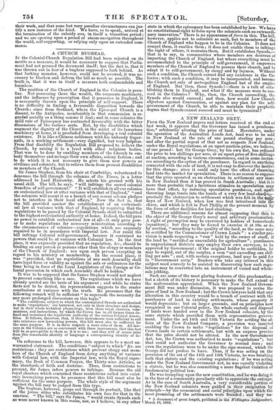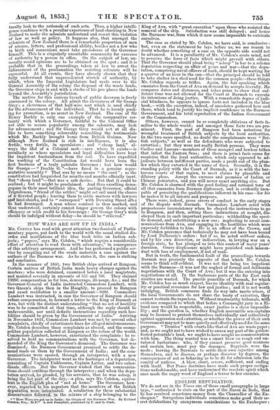A NEW ZEALAND GREY.
Elton the New Zealand papers and letters received at the end of last week, it appears that the Governor has issued a proclama- tion,* arbitrarily altering the price of land. Heretofore, under the operation of the Australian Lands Act, land was to be sold in New Zealand at the rate of one pound sterling per sere; and after the partial repeal of that act as respects New Zealand, under the Royal regulations, at an upset auction-price, we believe, of one pound : but Sir George Grey, by his own fiat, has reduced the price to ten shillings per acre, or an upset price of five shillings at auction, according to various circumstances, and in some instan- ces according to the option of the purchaser. In regard to anything connected with the sale of land, it is not easy to discover the motive for this change ; since it could only have the effect of throwing land into the market for speculation. There is no reason to suppose that the price operated as an obstruction to settlement any more in New Zealand than it has proved in South Australia ; but it is more than probable that a factitious stimulus to speculation may have that effect, by inducing speculative purohaf.es, and awn throwing large tracts into the hands of a very few land-shark precisely the obstruction to settlement which was felt in thq days of New Zealand, when law was first introduced into the chaos, and which is felt in Port Philip at the present moment by the force of other facilities for land-sharking. There are additional reasons for almost supposing, that this is the object of Sir George Grey's novel and arbitrary proclamation. A right of preemption may be exercised by holders of homesteads (squatters) ; but they may be forced to exercise it at 108. or 5s. by auction, " according to the quality of the land, as the same may be certified by the Commissioner of Crown Lands " : a similar pro- vision is made respecting a "run" held by the owner of stock, if the land be "certified as unavailable for agriculture "; purchasers in unproclaimed districts may employ their own surveyor, to be approved by Government ; if the original holder be outbidden, he may be repaid, out of the surplus, a sum "not exceeding one shil- ling per acre " ; and, with certain exceptions, land may be paid for in " Government scrip." Readers who take any interest in this subject need scarcely to be assisted in discovering how such regu- lations may be converted into an instrument of varied and whole- sale jobbing. Such are some of the most glaring features of this proclamation ; but a sketch of its history is necessary to make the full extent of the malversation appreciated. When the New Zealand Govern- ment Bill was under discussion, it was proposed to revise the price of land in New Zealand ; but the Crown lawyers held that any alteration in this country would be a breach of contract with the purchasers of land in existing settlements, whose property it would depreciate ; but on larger grounds, and on principles now recognized in our Colonial policy, the whole custody and disposal of lands were handed over to the New Zealand colonists; by the same statute which provided them with representative govern- ment. Under the act 14th and 15th 'Victoria for settling inserted enabling af-
fairs of the New Zealand Company, a provision was nserted enabling the Crown to make " regulations " for the disposal of Crown lands in certain settlements, but with an express proviso that the price should not be altered. In the new Governinent Act, too, the Crown was authorized to make " regulations"; but that could not authorize the Governor to rescind laws ; and even the regulations were to be under the sign-mannal, which Sir George did not profess to have. Thus, if he was acting on the provision of the act of the 14th and 15th Victoria, he was breaking both that statute and the existing regulations ; if he was acting under the New Zealand Government Act, he was equally violating a statute, but he was also committing a more flagrant violation of fundamental political law. He was trampling upon the new constitution, and he was doing it in the face of a community peculiarly able to appreciate the outrage. As in the case of South Australia, a very considerable portion of the New Zealand colonists were guided in their emigration by principle—by the economical and social principles upon which the most promising of the settlements were founded ; and they na- • A document of great length, published in the Wellington Independent, March 19, 1863.
turally look to the rationale of such acts. Thus, a higher intelli- gence combines with a peculiar experience of land-sharking in New Zealand to make the colonists understand and resent this violation of law as well as policy. It happens also, that amongst the colonists of New Zealand there is a remarkable proportion of men of science, letters, and professional ability, besides not a few who in birth and connexions must take precedence of the Governor himself. This is a singularly unsuitable community for excesses of authority by a person in office. On the subject of law, un- usually sound opinions arc to be obtained on the spot ; and it is probable that in the proceedings taken at law to arrest the enforcement of the proclamation the resisting colonists will be successful. At all events, they have already shown that they fully understand that unprecedented stretch of authority, by which, when the Imperial Legislature had made over to the General Assembly of the colony the disposal of the waste lands, the Governor steps in and with a stroke of his pen places the lands beyond the Assembly's jurisdiction.
The motive for this curious breach of public decorum is freely canvassed in the colony. All admit the cleverness of Sir George Grey ; a cleverness of that half-wise sort which is used chiefly for the advancement of the individual. That he is keenly push- ing for promotion, is no secret in New Zealand. The case of Sir Henry Barkly is only one example of the comparative cer- tainty with which a Governor, faithful to the Colonial Office yet able to secure popularity among. the colonists, may look for advancement ; and Sir George Grey would not at all dis- like to have something colourably resembling the testimonials which Mr. Barkly brought home from British Guiana. Now although New Zealand is rich in intelligence, it is also fertile, very fertile, in speculators ; and " cheap land," al- ways the idol of a Colonial mob—save where it exists— is peculiarly so where speculators and legal difficulties have kept the impatient husbandman from the soil. To have expedited the working of the Constitution Act would have been the first business of a truly patriotic Governor ; but how would Sir George -- " Double G. "—have fared in a genuine repre- sentative assembly P That was by no means " the card " ; so the constitution had languished for months and months officially inert. But " cheap land "—that was a safe device. Not that it could be realized ; but it might be proclaimed. And thus excelling dema- gogues in their most brilliant idea, the parting Governor, official Tiiptolemus, " friend of the settler," might set sail amid the cheers of AI-devoted people ; leaving them to settle matters with lawyers lttiid-sharks, and to " correspond" with Downing Street after lie dad decamped. A man whose conduct is thus marked, and Aid 'understood, certainly cannot longer govern the colony with efficiency or with credit to his Sovereign : Sir George Grey's wish should be indulged without delay—he should be " relieved. '



























 Previous page
Previous page